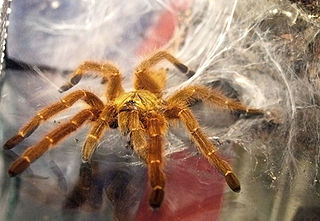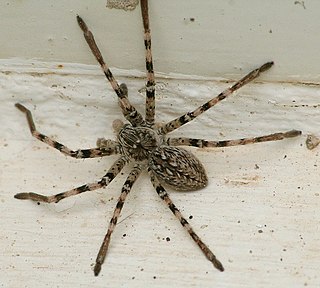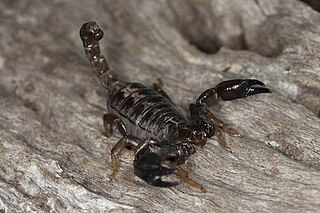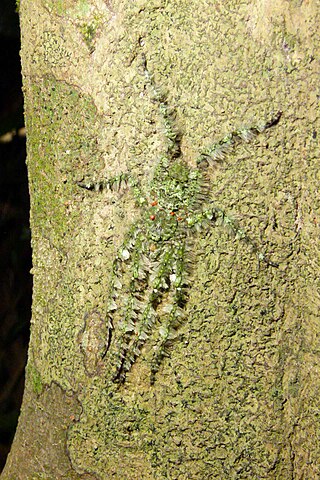Cocalodes is a genus of jumping spiders that was first described by Reginald Innes Pocock in 1897. The name is an alteration of the salticid genus Cocalus.

Idiopidae, also known as armored or spiny trapdoor spiders, is a family of mygalomorph spiders first described by Eugène Simon in 1889.

Barychelidae, also known as brushed trapdoor spiders, is a spider family with about 300 species in 39 genera.

Pterinochilus is a genus of baboon spiders that was first described by Reginald Innes Pocock in 1897. They are found all throughout Africa.

Idiosoma is a genus of Australian armoured trapdoor spiders that was first described by Anton Ausserer in 1871. Originally placed with the Ctenizidae, it was moved to the armoured trapdoor spiders in 1985. The name is derived from the Greek ἴδιος, meaning "individual, unique", and σῶμα, meaning "body", referring to the distinctive structure of the abdomen.

Ordgarius is a genus of orb-weaver spiders first described by Eugen von Keyserling in 1886. Adult females of the genus are bolas spiders, capturing their prey with one or more sticky drops at the end of a single line of silk rather than in a web. Males and juvenile females capture their prey directly with their legs.

Tarantulas comprise a group of large and often hairy spiders of the family Theraphosidae. As of December 2023, 1,100 species have been identified, with 166 genera. The term "tarantula" is usually used to describe members of the family Theraphosidae, although many other members of the same infraorder (Mygalomorphae) are commonly referred to as "tarantulas" or "false tarantulas". Some of the more common species have become popular in the exotic pet trade. Many New World species kept as pets have setae known as urticating hairs that can cause irritation to the skin, and in extreme cases, cause damage to the eyes.

Neocteniza is a genus of armored trapdoor spiders that was first described by Reginald Innes Pocock in 1895. Originally placed with the Actinopodidae, it was moved to the Idiopidae in 1985.
Titanidiops is a genus of armored trapdoor spiders that was first described by Eugène Louis Simon in 1903. As of April 2022 it contains 9 species.

Eusparassus is a genus of huntsman spiders, known as the stone huntsman spiders, it was first described by Eugène Louis Simon in 1903.
Anoploscelus is a genus of East African tarantulas that was first described by Reginald Innes Pocock in 1897. It was erected for the species Anoploscelus celeripes, based on a single male collected near Lake Tanganyika in modern day Tanzania. It was synonymized with Phoneyusa from 1985 to 1990. As of December 2019 it contains two species, including A. lesserti, first found in Rwanda in 1946.
Eumenophorus is a genus of Sierra Leonean tarantulas that was first described by Reginald Innes Pocock in 1897. As of March 2020 it contains two species, found in Sierra Leone: E. clementsi and E. murphyorum. It is considered a senior synonym of Monocentropella.

Monocentropus is a genus of tarantulas that was first described by Reginald Innes Pocock in 1897. As of March 2020 it contains three species, found on Madagascar and in Yemen: M. balfouri, M. lambertoni, and M. longimanus.

Urodacus manicatus, commonly known as the black rock scorpion, is a species of scorpion belonging to the family Urodacidae. It is native to eastern Australia.

Pandercetes is a genus of huntsman spiders that was first described by Ludwig Carl Christian Koch in his 1875 treatise on Australian spiders. They are mainly distributed in tropical Asia and Australia, and are known for their cryptic coloration that matches local moss and lichen. Their legs have lateral hairs, giving them a feathery appearance, further masking their outline against tree trunks. Their head is somewhat elevated and the carapace has the thoracic region low and flat.

Latouchia is a genus of Asian mygalomorph spiders in the family Halonoproctidae, first described by Reginald Innes Pocock in 1901. Originally placed with the Ctenizidae, it was moved to the Halonoproctidae in 2018.
Eubrachycercus is a monotypic genus of East African brushed trapdoor spiders containing the single species, Eubrachycercus smithi. It was first described by Reginald Innes Pocock in 1897, and has only been found in Somalia.
Brachionopus is a genus of South African tarantulas that was first described by Reginald Innes Pocock in 1897. It was transferred to the Theraphosidae from the Barychelidae in 1985.
Sarotesius is a monotypic genus of East African huntsman spiders containing the single species, Sarotesius melanognathus. It was first described by Reginald Innes Pocock in 1898, and is found in Africa.
Brachytheliscus is a monotypic genus of southern African mygalomorph spiders in the family Entypesidae containing the single species, Brachytheliscus bicolor. It was first described by Reginald Innes Pocock in 1902, and it has only been found in South Africa. It was previously considered a junior synonym of Hermacha, but was moved to genus status in 2021. The type species was originally described under the name "Brachythele bicolor".











